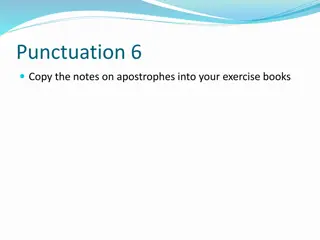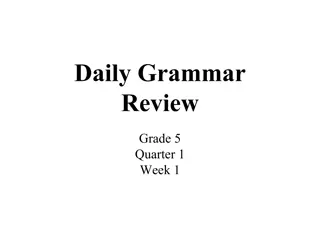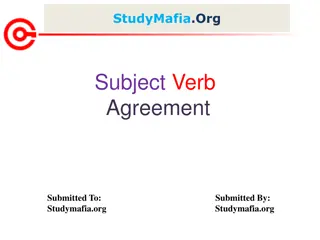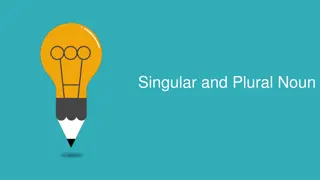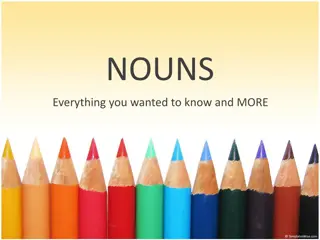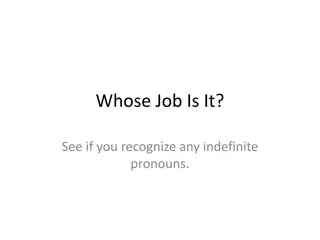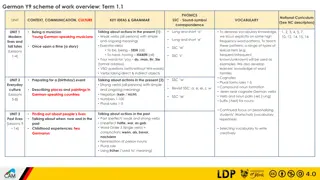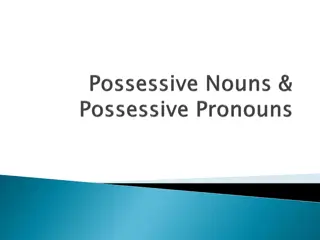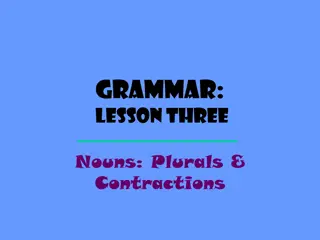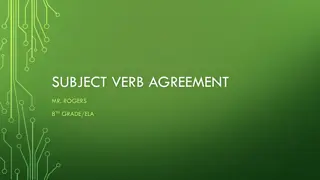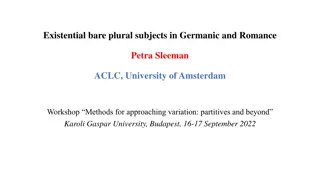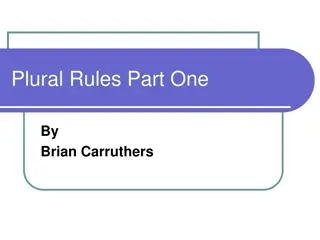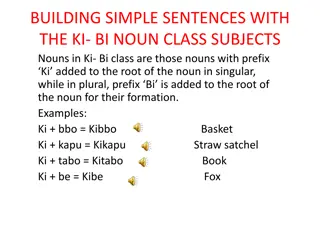French Activities for 3rd Year Students - First Semester
Engage with activities like riddles, plural nouns, articles, conjugation, and more in this French learning resource designed for 3rd-year students in the first semester.
0 views • 13 slides
Understanding Active and Passive Voice in English Grammar
Learn about active and passive voice in English grammar with clear explanations, examples, and rules. Discover how to transform sentences from active to passive voice while maintaining tense and meaning. Explore different tenses and their formations in both singular and plural contexts.
11 views • 14 slides
Subject/Verb Agreement Practice Exercises
Practice identifying subjects and verbs, and correcting verb agreement errors in sentences. Examples include singular/plural subjects with corresponding verbs and compound subjects. Improve your understanding of subject-verb agreement through interactive exercises.
0 views • 5 slides
Understanding Subject-Verb Agreement in English Sentences
Learn about subject-verb agreement in English sentences with singular and plural nouns, first, second, and third person examples, uncountable nouns, and exceptions where plural nouns take singular verbs. Discover how to match the verb form to the subject noun in different scenarios to ensure grammat
0 views • 17 slides
Demonstrative Pronouns: This, These, That, Those - Examples and Exercises
Learn about demonstrative pronouns "this," "these," "that," and "those" with examples and exercises for both singular and plural nouns. Explore how to correctly use these pronouns in sentences and strengthen your understanding through interactive questions. Practice identifying and differentiating b
1 views • 17 slides
Evolution of the Constitution in Switzerland
The Republic of Switzerland, a federal republic with 26 cantons, has evolved through three major constitutions - 1848, 1874, and 1999. Over the years, Switzerland has seen significant changes in its political structure, moving from a confederation to a federation and embracing unique features like D
0 views • 18 slides
Learn Plural and Singular Forms with Animals in English
This lesson focuses on differentiating between plural and singular forms using animals as examples. Students will learn to write sentences using "They're" for plural and "It's a" for singular, while looking at pictures of various animals. By the end of the lesson, students will be confident in using
1 views • 6 slides
Mastering Apostrophes: A Guide to Correct Usage
Understanding the proper use of apostrophes is vital in written communication. Learn how to indicate omission and possession correctly, including handling plural possessives. Avoid common pitfalls like improper use with personal pronouns to enhance your writing skills.
0 views • 11 slides
Understanding Different Types of Executive in Government Systems
The executive branch of government is responsible for implementing and enforcing laws created by the legislative branch. There are different types of executives, including nominal/real, single/plural, and hereditary/elected. The distinction between these types is crucial in defining the roles and re
0 views • 20 slides
Innovations in Hasidic Yiddish Pronominal System
Explore the evolution of pronouns in the Hasidic Yiddish language system, showcasing simplifications and changes over time. The research delves into the linguistic characteristics of Hasidic Yiddish speakers in Stamford Hill, London, highlighting the influences of various Hasidic groups and geograph
1 views • 24 slides
Guidelines for Forming Singular and Plural Nouns
This collection provides clear guidelines for forming singular and plural nouns, including adding "-s", "-y endings, and "-ies". It also covers exceptions, proper nouns, and tips on pluralizing certain words. Learn when to add "-es", double consonants, or when a false pronunciation might occur.
0 views • 21 slides
Grade 5 Daily Grammar Review Week 1 & 2 Exercises
Enjoy practicing grammar with daily exercises covering various topics like sentence structure, punctuation, plural forms, and context clues. Enhance your grammar skills in an engaging way with these helpful challenges for Grade 5 students.
0 views • 60 slides
Mastering Subject-Verb Agreement: Essential Grammar Rules for Class 10 English
Explore the fundamentals of subject-verb agreement in English grammar with Assistant Teacher Abul Kashem Miah. Learn the rules, examples, and practical applications for both singular and plural subjects. Enhance your understanding through comprehensive lessons and exercises. By the end of this class
1 views • 17 slides
Noun Declensions in Latin - Rules and Examples
Explore the declensions of nouns in Latin for the second declension, including masculine and neuter genders. Learn about the endings for singular and plural forms, along with specific rules for each gender. Dive into the differences between masculine and neuter noun declensions with detailed explana
0 views • 7 slides
Understanding Community Wealth Building for Socially Just Economies
Community Wealth Building focuses on fairer, socially just economies through progressive concepts like anchor institutions, plural ownership, and fair labor markets. It promotes broad ownership and distribution of wealth for national and international benefits, including productivity, social, and en
0 views • 28 slides
Understanding Subject-Verb Agreement in Grammar
Subjects and verbs must agree in number to ensure grammatical accuracy. Singular subjects require singular verbs, while plural subjects demand plural verbs. Various rules and examples illustrate how prepositional phrases, word order, and questions can impact subject-verb agreement.
0 views • 28 slides
Understanding Singular and Plural Nouns
Learn the rules of singular and plural nouns, including regular and irregular forms. Discover how to form plurals with examples like adding -s, -es, -ies, or -es to words ending in specific letters like -s, -x, -z, -ch, -sh. Enhance your grammar skills with this comprehensive guide.
0 views • 10 slides
All About Nouns: Types, Rules, and Examples
Explore the world of nouns - words that name people, places, things, or ideas. Learn about singular/plural, common/proper, concrete/abstract nouns, possessive/collective nouns, and rules for making singular nouns plural with helpful examples.
1 views • 22 slides
Language & Grammar Skills Practice
Identify correct punctuation usage, differentiate between questions, commands, and statements, distinguish between nouns and adjectives, select the appropriate plural forms, and count the number of verbs in each sentence. Practice your language and grammar skills with this interactive content.
1 views • 5 slides
Understanding Subject-Verb Agreement in English Grammar
In this multimedia class session, Assistant Head-teacher Uttam Adhikary introduces the concept of subject-verb agreement, emphasizing the importance of matching singular subjects with singular verbs and plural subjects with plural verbs. Through engaging examples and presentations, students will lea
0 views • 41 slides
Understanding Countable and Uncountable Nouns
Countable nouns have singular and plural forms and can be used with articles like "a" and "the," while uncountable nouns have only one form and cannot be quantified with numbers. Countable nouns can stand with numbers or articles, while uncountable nouns can be used with specific words like "some" o
0 views • 16 slides
Understanding Collective Nouns in Grammar
Exploring collective nouns, which refer to groups of people or things. Learn when to use singular or plural verbs with collective nouns. Examples like "jury," "team," "class," "couple," and "family" illustrate how sentence structure changes based on how the group is regarded. Enhance your grammar sk
0 views • 4 slides
Understanding Indefinite Pronouns: A Tale of Everybody, Somebody, Anybody, and Nobody
This story highlights the importance of recognizing indefinite pronouns such as everybody, somebody, anybody, and nobody. Through the tale of four individuals and a task left undone, the narrative emphasizes the roles of common, singular, and plural indefinite pronouns in subject-verb agreement. Exp
0 views • 11 slides
German Year 9 Scheme of Work Overview: Term 1
This German Year 9 scheme of work overview for Term 1 covers phonics, communication, culture, and grammar vocabulary. It includes topics such as sound-symbol correspondence, verbs, vocabulary development, word families, plural forms, compound nouns, past tense, future plans, routines, and special ev
0 views • 7 slides
Understanding Possessive Nouns and Pronouns in English Grammar
Explore the usage of possessive nouns and pronouns in English grammar through examples of singular and plural possessive forms. Learn how possessive pronouns replace possessive nouns to indicate ownership effectively in sentences. Enhance your understanding of forming possessive constructions and ap
0 views • 10 slides
Understanding Plural Nouns in English Grammar
Exploring the rules for forming plural nouns in English, from adding "s" to special cases like words ending in "s," "ch," "sh," "x," or "z." Learn how to modify nouns ending in vowels or consonants, as well as irregular plural forms and compound words. Enhance your grasp of English grammar with prac
0 views • 16 slides
Understanding Singular and Plural Nouns
Singular and plural nouns can sometimes be confusing, but this guide clears up common misconceptions. Learn when to use plural nouns for singular items, how certain nouns can be singular or plural, and when to use singular or plural verbs with specific nouns like sports teams or companies. Recognize
0 views • 9 slides
A Guide to Subject-Verb Agreement Basics
Understand the essentials of subject-verb agreement in sentences. Learn how singular subjects match singular verbs and plural subjects pair with plural verbs. Discover key rules, including handling words between the subject and verb, dealing with prepositional phrases, and recognizing subject placem
0 views • 7 slides
Existential Bare Plural Subjects in Germanic and Romance Languages
Workshop explores the variation in using existential bare plural subjects in English, Dutch, Spanish, Italian, and other languages, presenting different linguistic analyses and theories regarding their occurrence across Germanic and Romance language families.
0 views • 49 slides
Understanding Subject-Verb Agreement
Master the rules of subject-verb agreement for singular and plural subjects, irregular verbs like be, have, and do, and compound subjects. Learn how to match singular subjects with singular verbs and plural subjects with plural verbs, and understand verb forms for different scenarios. Explore exampl
0 views • 40 slides
Understanding Singular and Plural Indefinite Pronouns
Explore the difference between singular and plural indefinite pronouns with examples. Learn about singular indefinite pronouns like 'each' and 'nobody', plural ones such as 'several' and 'few', and those that can be both singular and plural like 'some' and 'all'.
0 views • 5 slides
Understanding Singular, Plural, and Possessive Nouns
Explore the basics of singular, plural, and possessive nouns with examples and guidelines on forming and using them correctly. Enhance your writing skills and grasp the concept of noun variations effortlessly.
0 views • 13 slides
Understanding Broken Plural in Arabic Grammar
Explore the concept of Broken Plural in Arabic grammar through this detailed content covering sound plural forms, patterns, and examples like Children, Geese, Teeth, Boys, Girls, Students. Gain insights into 3rd person female singular nouns, pronouns, pointers, and verbs in Broken Plural form. Disco
0 views • 21 slides
Understanding Compound Subjects in Grammar
Compound subjects joined by "and" usually require plural verbs, while compound subjects joined by "or," "nor," "either or," or "neither nor" may be singular or plural depending on the subject closest to the verb. Recognizing when to use singular or plural verbs with compound subjects is essential fo
0 views • 5 slides
Mastering Plural Rules: Practical Tips for Crafting Plurals Easily
Enhance your knowledge of plural rules through a comprehensive guide by Brian Carruthers. Explore strategies for forming plurals using common suffixes and exceptions, accompanied by engaging examples. Boost your grammar skills effortlessly with this resource.
0 views • 19 slides
Grammar Rules Guide: Capitalization, Possessives, and Plurals
Learn the rules of capitalization, possessives, and forming plurals in English grammar. Understand when to capitalize titles, direct addresses, and regions. Discover how to form possessives for singular, plural, and irregular nouns. Get insights on creating plural forms, especially for compound word
0 views • 10 slides
Constructing Sentences with Ki-Bi Noun Class
Learn how to form simple sentences using nouns in the Ki-Bi class. Discover how to create plural nouns and construct subject-predicate sentences with the appropriate prefixes. Explore examples and rules for transforming singular nouns into plural forms. Master the use of Ki and Bi prefixes for effec
0 views • 5 slides
Understanding Subject-Verb Agreement in Grammar
Explore the importance of subject-verb agreement in sentences, where a singular subject requires a singular verb and a plural subject needs a plural verb. Learn how to match subjects and verbs correctly to maintain agreement. Discover tips, examples, and resources to enhance your grammar skills effe
0 views • 73 slides
Understanding Subject-Verb Agreement in Grammar
Learn about subject-verb agreement with singular and plural nouns, including examples and explanations. Explore how collective nouns impact verb usage, whether they are treated as singular or plural. Practice exercises provided for better understanding.
0 views • 15 slides
Understanding Singular and Plural Numbers in English Grammar
Explore the concept of singular and plural numbers in English grammar. Learn about the rules for converting singular nouns to plural, including adding "-s" and "-es" as suffixes. Discover exceptions to the rules and when to use them. Enhance your knowledge of English grammar with practical examples
0 views • 27 slides







